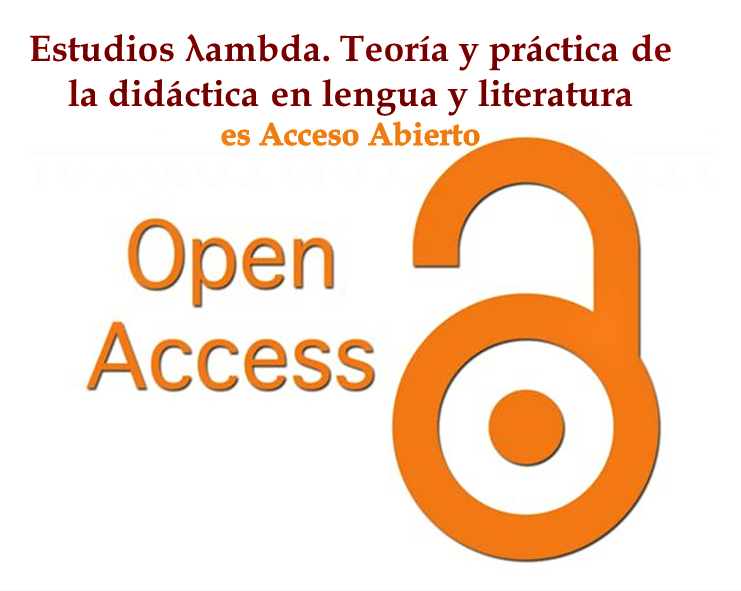λambda Studies. Theory and Practice of Language and Literature Didactics is a digital journal, published continuously every six months, with open access, free of charge and peer-reviewed using a double-blind methodology. The journal is scientific and reflective in nature, with an emphasis on innovation and research related to the teaching of: language and literature, discourse analysis, cultural studies, literacy studies and literary theory. It also includes publications on interdisciplinary research related to the aforementioned topics, as well as the processes of comprehension and production of texts in L1 and L2.
Ethics and Good Editorial Practices
The Editoral Board of Estudios Lambda. Teoría y práctica en lengua y literatura declares that its guidelines are normed by the Federal Law of Authors’ Rights in Mexico (Ley Federal de Derechos de Autor en México) and that it adopts the international standards published by
- The Committee of Publication Ethics (COPE, 2011, 2018)
- The Good Editorial Practice Guidelines for Scientific Journals and Monograph Series
- The Publishing Ethics Resource Kit, developed by Elsevier editorial board.
The Editorial Board’s goal is to guarantee transparency in the publication of the contributions and in the procedures for the resolution of associated conflicts as well. Furthermore, the journal uses the Copyleaks software to detect plagiarism. All documents received are due to inspection.
The Editorial Board of Estudios Lambda Teoría y práctica en lengua y literatura will make sure that all parties involved, authors, peer reviewers, and editors abide by the ethical bylaws in the complete editorial process.
Bylaws for authors
Authors must submit research papers for publication according to established Bylaws for authors in the journal.
A conduct is considered inappropriate when:
- A fraud is detected when published data or conclusions were generated by some others investigation, experiment, and/or by arranging or manipulating data.
- Interventions in a classroom are made with willful manipulation of variables without an informed consent of the participants.
Faults of ethics are considered serious when:
- Plagiarism is found evident, that is, when an author or authors use another work without permission, credit or acknowledgement. Plagiarism is manifested in three different forms: when it is literally done, even when it is paraphrased without reference (Elsevier 2019)
- A research paper is submitted for publication to more than one journal or editorial board at a time. Also, it is considered a serious fault when a research paper has substantial parts from another paper already published. When a paper is submitted for publication, the author must inform the Editorial Board about previous papers or reports that could be considered redundant or duplicated publications from the same research project. Any of the publications must be referred to in the new paper.
- Conflict of interest is detected. Conflict of interest is presented when an author (or the institution for which he/she works), the peer reviewers or the editors have finance or personal relations that could inappropriately influence their actions.
- Authors must reveal relations or reasons that could represent a conflict of interest in a “Declaration of no-conflict of interest”.
- Conflicts of authorship are presented when there is no agreement with the type of authorship contribution: shared authorship, undeserved authorship, disputed authorship, and ghost authorship.
- Shared authorship is presented when the participant researchers belong to different disciplines and have contributed in a multidisciplinary inquiry. In these cases, the order of appearance of authors must be agreed upon and declared in written.
- Undeserved or honorary authorship is that which is granted to a person, without any substantial contribution to the design process or writing, or without any important contribution to the intellectual contents.
- Disputed authorship is presented when a researcher claims total or partial authorship of the contents of a published paper. In this case the editor must solve the problem informing the author(s) and asking from them an agreed upon or motivated decision. When this does not happen the editor must require the intervention of the institution to where the authors belong in order to solve the conflict.
- Ghost authorship or rejected authorship consists in not including as author a person who has substantially contributed to a research or its writing. It is the opposite side to the undeserved or honored authorship.
Bylaws for reviewers
Peer reviewers must:
- Declare conflicts of interest or inabilities
- Strictly adhere to the policies of the evaluation process of the journal
- Answer applications and return evaluations on time
- Make up a methodical and meticulous evaluation, as it is expected, due the level of expertise of the reviewer.
- Respect confidentiality of the information linked to the editorial process
In order to know in detail the guidelines for peer reviewers, please consult the following address http://publicationethics.org/files/Ethical_guidelines_for_peer_reviewers_0.pdf
Bylaws for editors
Editors must:
- Guarantee the transparency of the contributions and the process of evaluation and publication
- Guarantee an objective dialogue and confidentiality with the parts involved in the editorial process
- Quickly and respectfully answer questions and notifications
- Guarantee the fulfillment of the international norms of ethics concerning the investigation and publication in all the scientific and editorial processes related to the journal.


